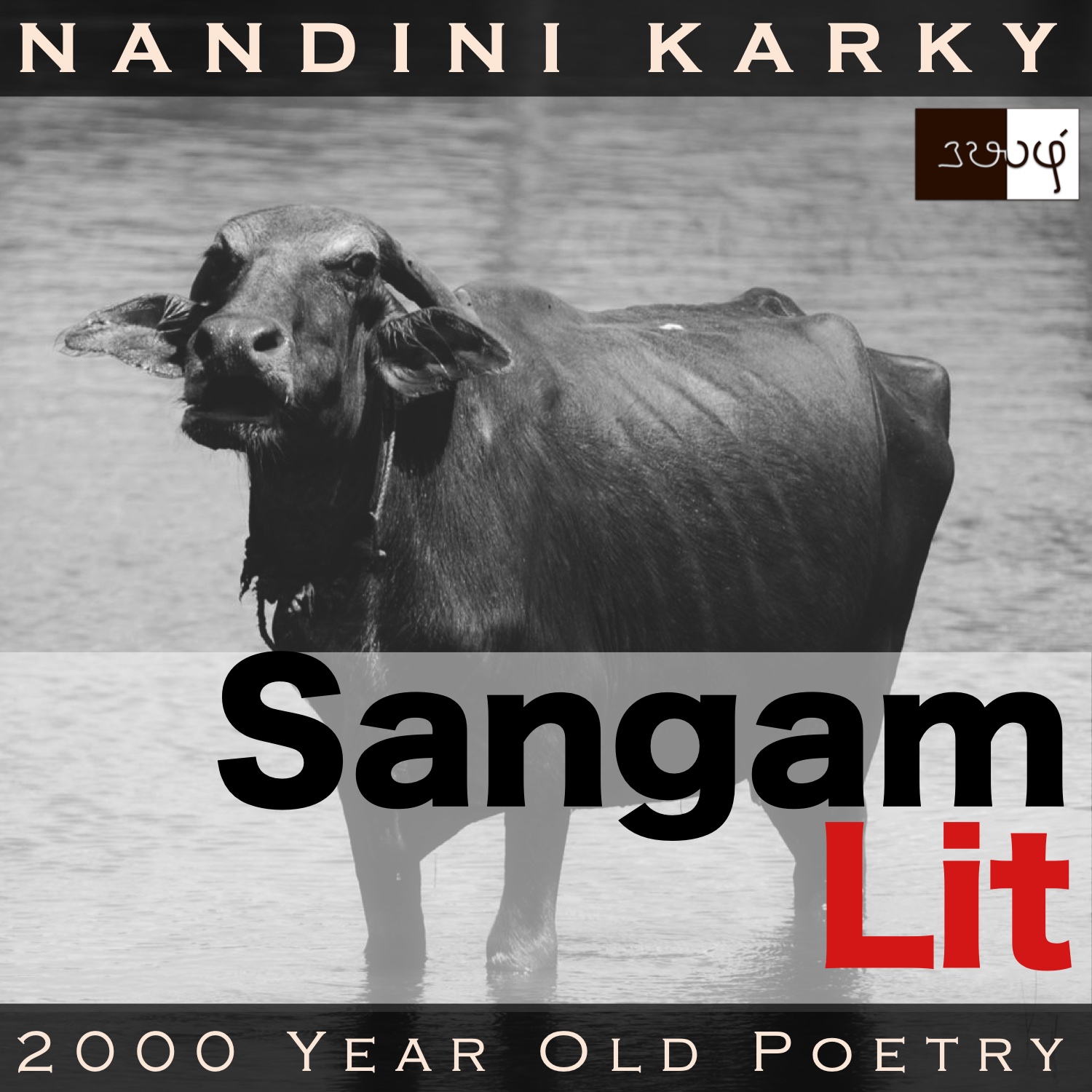Podcast: Play in new window | Download
Subscribe: Apple Podcasts | Spotify | Amazon Music | Android | iHeartRadio | Email | TuneIn | RSS | More

In this episode, we perceive how scenes on a rainy night express the storm in a lady’s heart, as portrayed in Sangam Literary work, Kurunthogai 261, penned by Kazhaarkeeran Eyitriyaar. Set in mountains of ‘Kurinji’, the verse speaks in the voice of the lady to the confidante, passing on a hidden message to the man, listening nearby.
பழ மழை பொழிந்தெனப் பதன் அழிந்து உருகிய
சிதட்டுக் காய் எண்ணின் சில் பெயற் கடை நாள்,
சேற்று நிலை முனைஇய செங் கட் காரான்,
நள்ளென் யாமத்து, ‘ஐ’ எனக் கரையும்
அஞ்சுவரு பொழுதினானும், என் கண்
துஞ்சா வாழி-தோழி!-காவலர்
கணக்கு ஆய் வகையின் வருந்தி, என்
நெஞ்சு புண் உற்ற விழுமத்தானே.
‘Sleepless and sorrowful, I am’ exclaims a voice here! The opening words ‘பழ மழை பொழிந்தென’ meaning ‘as old rains poured’ make us wonder what could the adjective ‘old’ mean in connection with ‘rains’. It’s not like the rains come with an ‘use-before’ date, do they? Let’s hold on to that thought for a while. In ‘பதன் அழிந்து உருகிய சிதட்டுக் காய் எண்ணின்’, which means ‘losing firmness, pods of sesame become mushy and hollow’ characterises the exact state of a plant in a particular moment of time. From flora, we turn to fauna in ‘செங் கட் காரான்’ referring to ‘a dark-hued buffalo with red eyes’. Time of the day is revealed by the words ‘நள்ளென் யாமத்து’ meaning ‘in the deep darkness of the midnight hour’. In ‘என் கண் துஞ்சா’ meaning ‘my eyes cannot sleep’, the core theme is evident. An intriguing phrase ‘காவலர் கணக்கு ஆய் வகை’ appears with the meaning ‘as guardians keep track of time’, about which we will explore shortly. Ending with the words ‘நெஞ்சு புண் உற்ற விழுமத்தானே’ meaning ‘as my heart is hurt and suffering’, the verse evokes our empathy.
Ruined sesame pods, a red-eyed buffalo and trackers of time make a fascinating combination! The context reveals that the man and lady were leading a love relationship and were trysting together for a while. One night, observing the man arrive, pretending not to notice him, but making sure he’s in earshot, the lady says to her confidante, “As old rains poured, its texture ruined, the sesame plant sprouts empty pods with mushy exteriors in the last days of the rainy season, characterised by little drizzles. Standing in slushy waters, an angst-ridden, red-eyed, black buffalo lets out a sharp grunt in the darkness of the midnight hour. May you live long, my friend. Even at this time that fills one with fear, my eyes sleep not, like those protectors, who analyse and keep time, as my worrying heart is wounded because of its deep sorrow!” With these words, the lady conveys her languishing state to the man and indirectly, persuades him to seek her hand in marriage.
Indeed, it seems to be a tale of ‘marry me, marry me’! Let’s delve into the details with which the lady presents her case. She starts by talking about how old rains have poured and because of this, the sesame plant’s pods have become mushy and empty. From context, we understand that this means that the rains have been untimely. It’s as if the lady is saying that the rains should have been used up at some earlier time but they have been stored for longer and now, when not expected, these rains are pouring down and leading to the ruin of the sesame crop. And therein, lies the inextricable connection between agriculture and weather! Returning, we learn that the lady has referred to this crop to indicate the time of the year, and more specifically, the last days of the rainy season when random showers start falling now and then. Owing to this, the ground gets slushy and standing in this mud-soaked surface, a black buffalo seems to be crying out aloud. Previously, if the lady used the sesame reference to talk about the time of the year, now she uses the buffalo reference to talk about the time of the day, which is the midnight hour, she details. She adds that even at this time, her eyes are sleepless like those of the protectors, who analyse time and it’s all because of the way her heart is hurting, the lady concludes.
Now, let’s leave the man to ponder over the lady’s words for a while and turn our attention to that mention of protectors who keep time at night. What could this signify? Are these people, guards who simply keep track of time to inform the townspeople or could they be ancient astronomers who watched the skies to read the stars? The exact nature of this profession is not clear but they seem to have the tasks of staying awake at night, making calculations about the passage of time and serving as guardians of their patrons as well. Sounds like a combination of time-keeper, astronomer and astrologer to me! Returning, we see the man has understood the angst in the lady’s heart which she mentions directly and also projects on the mushy sesame plant being ruined by untimely rains as well as the buffalo in the slush crying out in the dark hour of night. With all these scenes and mention of the timekeepers, the lady is in fact, nudging the man saying it’s time he gave up temporary trysting and sought the permanent happiness of a married life with her. Time seems to be the hero of the verse, extending its influence on the skies above, flora and fauna around and even, people’s professions!




Share your thoughts...